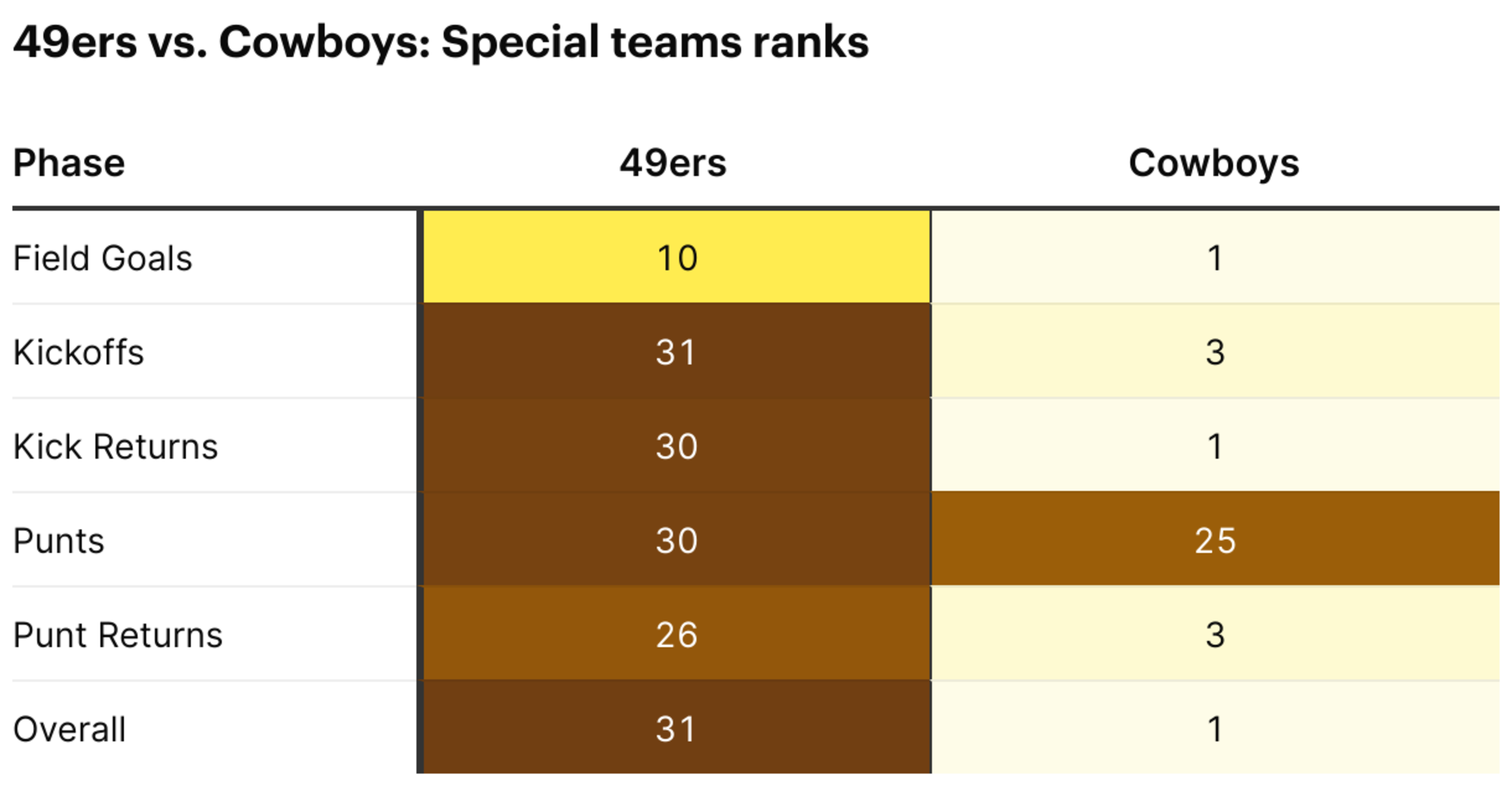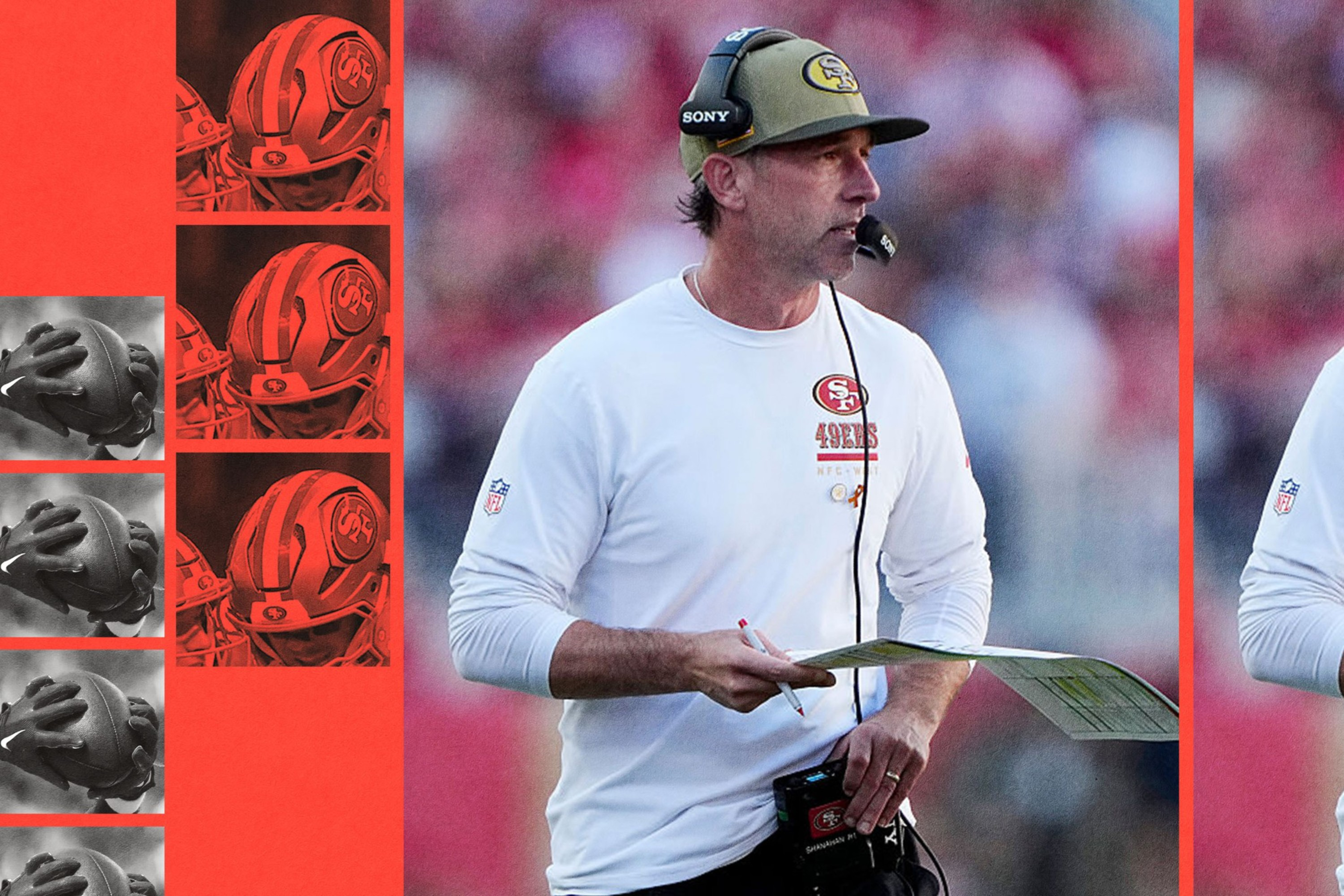The staggering 49ers, 3-4 entering this final game before their bye week, would like the Dallas Cowboys to serve as this season’s version of the Los Angeles Rams.
Since that reference necessitates historical perspective: The Rams are the team against whom the 49ers reversed gloomy outlooks in two recent seasons. They entered a 2021 game against L.A. leaking oil at 3-5 — and won 31-10. In 2022, they went into the game against the Rams struggling at 3-4 — and won 31-14.
Both wins sparked turnarounds that led all the way to the NFC championship game. Now, the Cowboys (3-3) are the ones standing in the 49ers’ way at another urgent juncture.
Though the 49ers don’t play Dallas as often as the NFC West’s Rams, they have enjoyed significant success against the Cowboys lately. Three wins in the last three seasons against Dallas give reason to believe that Sunday night can offer a dosage of get-well medicine for the 49ers.
“It’s good to look back and reference those sort of things,” 49ers Fred Warner said Wednesday. “But every year’s different. Every situation is unique. And I think about what our team needs right now is not these grandiose fixes, kumbayas, or whatever you want to call it. It’s just small changes that make the biggest difference.”
Relatively minute tweaks and big additions have helped the 49ers correct course in the past.
In 2021, alignment shifts in the front seven patched up their run defense, leading to newfound defensive efficiency. A recommitment to the short passing game also led to more offensive consistency.
The 2022 reversal was splashier. Star running back Christian McCaffrey arrived via trade, turbocharging the offense to the NFL’s top spot. Other dominoes naturally fell into place as a result of the attack’s dominance.
The formula here in 2024 is clearly reliant on a mix of big and small adjustments. The 49ers must once again make strides in their run defense, which ranks No. 26 by expected points added (EPA) per play. That’s one small change that Warner alluded to.
But the team’s key to solving many of its offensive struggles may again lie in McCaffrey, who spent part of Wednesday shooting on the basketball hoop in the 49ers’ locker room. There’s hope McCaffrey, whom 49ers coach Kyle Shanahan called “the NFL MVP” on Wednesday, can return from Achilles tendinitis as soon as Week 10 against Tampa Bay. That’s the team’s first game following the upcoming bye week.
But like a boxer straining to stay upright in the final seconds of a bruising round, the 49ers must first reach that bye without McCaffrey. Dallas’ league-worst run defense stands in the way. It might be the perfect pill for a 49ers’ rushing offense that couldn’t gain a single yard in numerous huge spots against the Kansas City Chiefs last week.
McCaffrey’s replacement, Jordan Mason, is the NFL’s only running back with seven or more carries from inside the 5-yard line who’s failed to score (opens in new tab) at least three touchdowns this season. Mason has actually lost one cumulative yard on his seven carries from inside the 5. He’s scored just once.
But that’s not necessarily an indictment of only Mason, who’s rushed for 667 yards this season. Many variables outside a running back’s control affect their production. And it certainly seems that the 49ers’ line and Shanahan’s scheme have struggled at decisive spots. The 49ers rank No. 25 — down from No. 7 last season — in power success rate, a measure of how often their runs in short-yardage situations on third and fourth downs succeed.
While identifying the root of problems is a complex endeavor, a solution might be simple: face a bad run defense. Dallas has allowed 143 rushing yards per game and might be missing edge rusher Micah Parsons, the team’s top defender who’s missed the past two games with a high ankle sprain.
The 49ers also have the upper hand statistically on the other side of the ball, where the Cowboys offense has sputtered to a No. 24 ranking in EPA. When it comes to just offense and defense, this lines up to be a mismatch.
But there is a catch — and it doesn’t resemble the famous one from the January 1982 NFC championship game that propelled the 49ers past the Cowboys and into their dynastic era.
This involves special teams, where the 49ers have been putrid while Dallas has posted the best efficiency in the league. The defense-adjusted value over average (DVOA) ranks of the two teams’ special teams units are jarring opposites.

The Cowboys have kicker Brandon Aubrey and returner KaVontae Turpin, who are among the NFL’s best at their positions. The 49ers, meanwhile, are on their third-string kicker, and they’ve been severely deficient in both the return and coverage phases of special teams.
“We’ve had to move a lot of guys around, from our starting gunners at the beginning of the year,” Shanahan said. “We’ve had to change our [punt protector], our wings, our right guard — I think we’ve changed about four times. So there’s a bunch of movement on those guys.”
The 49ers may again have a new gunner on Sunday, as the team signed receiver Malik Turner — who performed that role for them in previous seasons — to its practice squad. He might replace Chris Conley, who’s likely in line for a greater role on offense since he’s the direct backup to receiver Brandon Aiyuk, who was just placed on injured reserve with a torn ACL and MCL.
The pressure is on 49ers special teams coordinator Brian Schneider to stop the special teams bleeding against a top-shelf Cowboys unit coordinated by John Fassel. Because while the 49ers may have the clear edge in this game, just one disastrous play on special teams can erase it.
“We’ve been struggling with [special teams],” Shanahan said. “In punt and kickoff, guys have gotten too big of returns on us. I know we gave up some blocks early in the year, which you’ve got to get that corrected with certain technique, but we’ve got to get a lot better at it. It’s pretty obvious to everybody. It’s obvious to us, it’s been that way for a few weeks and I can’t give you guys one narrative on it, because there’s not one narrative. It’s about working with everyone, holding people accountable, and coaching them up the best we can to get them better.”
Extra points
• Like McCaffrey, receiver Deebo Samuel shot hoops in the locker room Wednesday. Samuel spent two nights in the hospital with pneumonia following Sunday’s game, during which he managed only four plays. Although Samuel didn’t practice on Wednesday, Shanahan said there’s a chance he plays against Dallas.
Tight end George Kittle (foot sprain) and receiver Jauan Jennings, who’s dealing with a hip issue, were also absent. But Shanahan has said that Jennings is expected to return this week. Kittle’s injury also does not appear likely to hold him out of Sunday’s game.
• The 49ers promoted rookie defensive tackle Evan Anderson from the practice squad to the 53-man roster. Aiyuk’s move to injured reserve had opened up a spot, so that means Anderson — an undrafted rookie who’s logged four pressures in just 13 pass-rushing snaps — will enjoy a significant pay bump.
The team also signed offensive guard Dieter Eiselen, a Yale graduate who shares agents with 49ers fullback Kyle Juszczyk (a Harvard alumnus) to the practice squad. Eiselen spent 2023 with the Houston Texans, whose offensive coordinator is former Shanahan underling Bobby Slowik, so he’s familiar with his new team’s offensive system.
Eiselen, who said he enjoys the cerebral aspect of playing center in Shanahan’s scheme, grew up in South Africa. He played rugby there and didn’t take up football until he moved to the United States for his senior year of high school.



